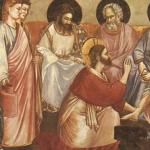What does it mean, being in the form of God?
We’re often so elated to see a new depiction of Jesus as one of us (only better), we sometimes fail to consider everything He is before He becomes one of us.

Paul addresses the question about who Christ is before He comes to earth.
This is the 2nd in a series on Philippians 2.5-11 CLICK
how to be the church with the mind of Jesus | Philippians ii.1 CLICK
Who, being in the form of God . . . (Philippians 2.6, KJV)
The term being is a strong word, not the one normally used for something that “is” or exists.
The term being means something has already been existing, and is existing now.
This is perhaps an ancient church hymn handed down to Paul. This hymn makes it clear that Jesus has already existed long before now. We’re just now catching up with Jesus as He appears in our Earthly story.
He was not merely born. He is already existing. The phrase could be better translated: “who, existing in the form of God.”[1]
Not only does our Lord already exist, but He exists in the form of God
Kenneth Wuest states: “The Greek word for ‘form’ refers to that outward expression which a person gives of his inmost nature. This expression is not assumed from the outside, but proceeds directly from within.”[2]
Kirk Gibson goes to college in Michigan to play football. He is such a great athlete, he is a “walk-on” in baseball. He eventually goes pro in baseball and is known for some legendary home runs. However, he is inducted into the College Football Hall of Fame. In form he is a baseball player or a football player, but he is in essence an unbelievable athlete.
Before Jesus comes to earth, He exists in form with God. He displays His Divinity. His form is the outward expression of His inner essence, His nature as God. He is willing to give up or modify the outer form to come to earth.
. . . thought it not robbery to be equal with God (Phil. 2.6)
Modern translations are a little closer to the original language here:
- did not consider equality with God something to be used to his own advantage (NIV)
- he did not think of equality with God as something to cling to (NLT)
- did not count equality with God a thing to be grasped (ESV)
The idea is that Jesus did not “white-knuckle,” or clench His form as God.
Jesus exists before time as equal with God
By equality, we are talking about Jesus as an equal member of the Trinity.
We are also talking about Jesus as equal in being, the Divine essence.
However, we are really talking about His form, “the expression of the divine essence.”[3] When Jesus becomes man, He doesn’t change His Divine nature, but His expression or His form. In other words, He may have a dual nature, but it doesn’t mean He is any less God. He is now fully God in a fully human form.
Paul is sharing a profound revelation in this hymn
Paul is a trained Rabbi, a strict Jew, who becomes a Christian. As a Christian, He teaches something totally against the Jewish mindset of His day.
Jesus is not only the Christ or Messiah, literally the anointed one. He is not only the man who carries the Heavenly anointing.
Jesus is a man who is also fully God, coexisting with God from eternity to eternity.
“Jesus’ existence did not begin in Bethlehem’s manger or in Mary’s womb. The One who came by way of Mary’s womb to Bethlehem’s manger is the eternal Son of the eternal God. From eternity past He was one with the Father.”[4]
This is the 2nd of a series on Philippians 2.
how to be the church with the mind of Jesus | Philippians ii.1 CLICK
notes:
[1] David R. Nichols, “The Lord Jesus Christ,” in ed. Stanley M. Horton, Systematic Theology (Springfield, MO: Logion Press, 2002), 317.[2] Kenneth S. Wuest, “Philippians,” in Philippians – Hebrews – The Pastoral Epistles – First Peter in these Last Days, vol. 2 of Wuest’s Word Studies From The Greek New Testament (Grand Rapids: Wm. B. Eerdmans, 1973), 62.
[3] Wuest, 64.
[4] J. Dwight Pentecost, The Joy of Living: A Study of Philippians (Grand Rapids: Zondervan, 1973), 66.












